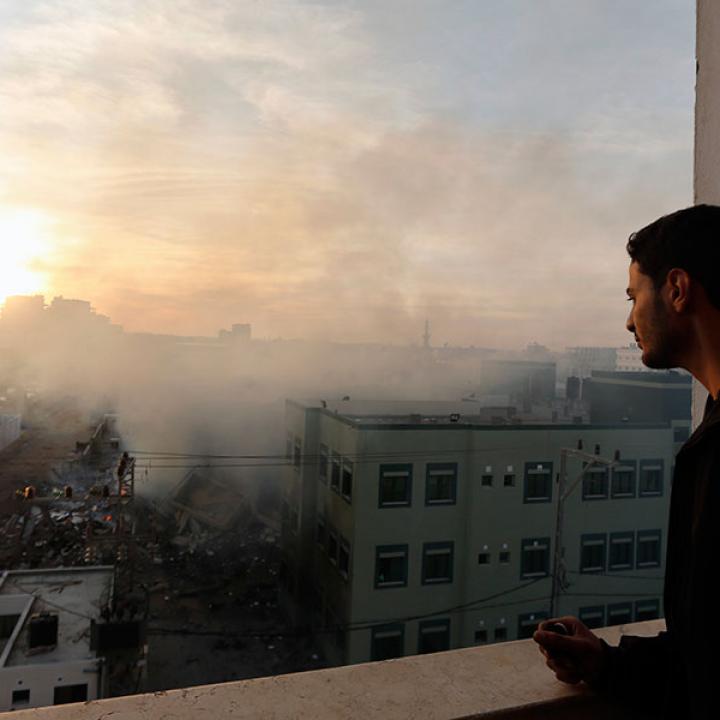
- Policy Analysis
- Articles & Op-Eds
The World Needs to Work to Prevent the Next War in Gaza

Although political tools to address Gaza's basic maladies are unfortunately limited at the moment, many existing economic tools could help right away, including initiatives related to power plants, water supplies, desalination, housing reconstruction, laborer permits, and more.
Two years on from the last round of armed conflict between Israel and Hamas, the border between the two is quiet, yet Gaza resembles a powder keg threatening to explode. For this reason, and because policy options to significantly reduce the dangers of escalation exist, Gaza deserves greater international attention and prioritisation.
Since Islamist Hamas took over Gaza in a violent coup in 2007, the Strip has witnessed constant deterioration and instability. Hamas has alienated its neighbours, challenged the internationally recognised Palestinian governing body -- the Palestinian Authority (PA) -- isolated itself regionally and internationally, and provoked Israel by constant rocket-firing, which resulted in three rounds of armed conflict. All the while Hamas prioritised its military build-up -- reportedly using 20 per cent of its budget on military expansion including rockets and cross-border offensive tunnels -- over the well-being of its citizens. The result: Gaza's economy is in dire straits and infrastructure is collapsing. And while international reconstruction efforts are in place they are slow and inadequate.
Fixing these maladies is challenging for several reasons. International funds are lacking, the PA is reluctant to play an active role in Gaza, Egypt is profoundly hostile to Hamas and Israel is wary of Hamas's belligerent intentions. Moreover, Hamas diverts some of the humanitarian reconstruction materials to its own military needs, and in recent years its radical military wing has developed cooperation with ISIS in Sinai as well as with Iran.
At this point neither Hamas nor Israel has an interest in another military round, yet Israelis consider another conflagration provoked by Hamas to be a matter of when, not if. Israel would prefer to use the significant deterrence achieved in its 2014 Operation Protective Edge as a basis for a long-term ceasefire arrangement, which could incorporate far-reaching reconstruction projects alongside strict security arrangements. However, overtures towards reconciling both parties' expectations have encountered numerous difficulties.
Indeed, political tools to address Gaza's basic maladies are unfortunately limited. Hamas's ideological rejection of Israel, reconciliation between Hamas and the PA, the PA's reluctance to involve itself in Gaza and Egypt's hostility towards Hamas are all unlikely to change in the near future.
Despite these difficulties, many existing economic tools that would help rehabilitate Gaza's collapsing infrastructures and improve its economy can and should be effectively and speedily advanced to alleviate the humanitarian crisis and reduce the chances of another war. Such measures include establishing a new electricity power plant and bringing the existing power station in Gaza to its full capacity; restoring Gaza's electricity transmission system and increasing and upgrading Israeli energy supplies to the territory; increasing Israel's water supply to Gaza, establishing a desalination plant and mending Gaza's water transmission system; and activating the existing waste water plant in northern Gaza and re-building another one in central Gaza. The recent Israel-Turkey reconciliation deal with an agreed-upon security envelope provides additional economic and political tools to deal with Gaza's problems. In addition, housing reconstruction should be speeded up and Gaza's economy strengthened by increasing exports, allowing additional Gazan labourers to enter Israel, and finding a permanent solution to the salaries of civilian public employees.
The next US Administration -- buoyed by active European support -- should prioritise basic humanitarian and economic solutions for Gaza, garner the necessary funds and create a political context for these solutions by advancing a long-term ceasefire arrangement, including an active PA role in the territory. Such an arrangement would bind Hamas to an extended timeframe and inject a measure of stability that would facilitate a further upgrade of reconstruction in Gaza, including a seaport with proper security arrangements. Should Hamas violate the agreement it would stand to lose more.
Given Hamas's nature, its control over Gaza represents an unresolved challenge to the long-term prospects of Israeli-Palestinian peace, which are anyway gloomy right now. As Hamas eyes the leadership of the Palestinian national movement in a post-Abbas era it is essential to improve Gaza's economy and infrastructure without bestowing legitimacy on Hamas at the expense of the PA, as long as the former refuses to renounce violence and accept a political solution that recognises Israel. It is time that all major international and regional stakeholders work more diligently to ease the pressure in Gaza and mitigate the risks of yet another violent eruption.
Brig. Gen. Michael Herzog, IDF (Res.), is a Milton Fine International Fellow at The Washington Institute. Previously, he served as head of the IDF's Strategic Planning Division and chief of staff to Israel's defense minister.
London Telegraph



